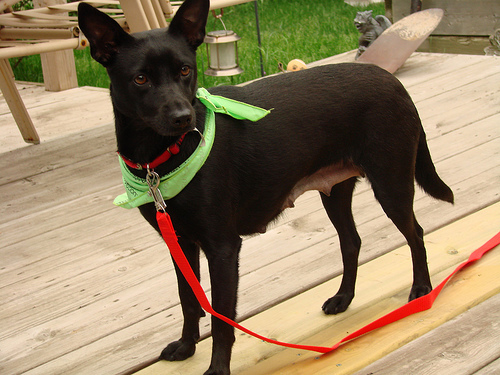QuestionHello all
I just wanted to thank you for letting me join this group. I have a jack russell terrier that is about 5 years old. I am having a problem with her and I was hoping someone would be able to help me with this situation. It seems that every year as it get close to summertime my jack seems to get some terrible hot spots. It seems like whenever someone leaves the room that she is in she is always scratching and rubbing her back on the floor. It is so bad that she will have bare spots on her fur coat. I know it is not fleas. But as for what might be happening is a mystery. Does anyone else have this problem?? Please help.
Thanks very much
Steve
AnswerHi Steve,
Dogs aren't stupid, perhaps your dog knows to scratch like crazy when somebody leaves the room because she's been told not to scratch!
Your first course of action is controlling your dog's itching should be a trip to your veterinarian. Since this is a seasonal problem, you may be right that your dog has some kind of allergy. Besides environmental sensitivities, many dogs develop allergies to food, pollen, dust mites, and mold.
Your vet can provide you with medications which can help break the cycle of itching, and give your dog's skin have a chance to heal. After the skin has healed, you may be able to slowly stop the medication, or at least not need it on a daily basis,
Because your dog is eating her skin raw, there is also the possibility of her developing a secondary infection, and antibiotics might be needed. Any long term solutions to this problem lay in diagnosing the cause of the problem.
The discovery of anti-inflammatory properties of evening primrose oils and fish oils (Omega 3&6 fatty acids) in humans has led to similar products on the market for pets. These products are not the same as oil supplements that are recommended as food supplements to make a pet's coat shiny, instead these are true anti-inflammatory drugs capable of relieving itchy skin.
When you talk to your vet, ask about the addition of Omega 3&6 fatty acids to your dog's diet, and what the correct dosage for your dog would be.
These supplements need to be given daily, and you may not see improvement for about a month.
Bathe your dog, or wash the "hot spots". Keeping the raw areas clean is very important. Adding some Epsom salts, baking soda, or colloidal oatmeal (like Aveeno) to the water will increase the bath's soothing effects. This will provide only a temporary relief lasting from a few hours to a few days. After the bath, pat the dog with a towel. Do not rub the skin, this will only increase the dogs itch. Do not use a hair dryer on a heat setting. A cool (no heat) setting would be okay. Heat and rubbing the dogs skin will increase your dogs itch, making the bath ineffective.
Bathe and rinse your dog with cool water, it's soothing, whereas rinsing with warm water can cause a histamine reaction that will only causes more itching.
The following suggestions just treat the symptom, not the cause of your dog's itch:
Over the counter antihistamines, such as Benadryl can provide complete or at least some relief for many dogs, especially when used in combination with omega-3 fatty acid supplements. The dose of Benadryl is based on your dog's weight, so check with your veterinarian, he/she can tell you how much Benadryl you can give and how often. Depending on the size of your dog, you may be able to give it twice a day. Benadryl may also interact with drugs that your pet is taking, so be sure to discuss use of ANY drugs for your pet with your vet first.
Antihistamines (such as Benadryl) are not free of side effects; they are notorious for drowsiness in some pets.
When your dog is scratching and itching 100% Aloe Vera gel can be a big help. You can get it from a health food store, and I've seen it at Walmart (only use 100%, not a blend). Aloe Vera gel comes from the Aloe Vera succulent plant and contains enzymes which break down inflammatory proteins and enhance healing. It really stops itching, and it's not harmful for dogs who lick it off. It shouldn't sting, but to be on the safe side you should apply it to just one area to see if it's causing any discomfort.
You can also try applying Milk of Magnesia to the red area. It contains Magnesium Hydroxide, which will help reduce the itch and irritation. You can apply it with a cotton ball several times a day.
Witch Hazel is another product you can buy at just about any drug store. It has a cooling effect as it penetrates the skin, killing bacteria and preventing infection, and also soothes inflamed skin.
It shouldn't sting, but if it seems to bother your dog, mix 4 tablespoons of Witch Hazel in 2 cups of cool water, after cleaning the hot spots dab some on. Don't rinse it off. You can use Witch Hazel 4-5 times a day.
One very effective natural home remedy for itchy hot spots is plain old black tea. It contains tannic acid, which acts like an astringent, drying the hot spots and helping them to heal more quickly. Just soak a tea bag in hot water, let it cool, and apply the bag directly to the sore for five minutes. You can do this three or four times a day.
Be sure to tell your veterinarian any home treatments you've tried, and how successful they were.
I hope I've been a help.
Best of luck,
Patti

 Dog Breed.
Question
Recent photo this week
Hello,
I saw that you
Dog Breed.
Question
Recent photo this week
Hello,
I saw that you
 18month old sweet shih tzu starting to growl at me
Question
our family
Hi Valentina,
I have recently beco
18month old sweet shih tzu starting to growl at me
Question
our family
Hi Valentina,
I have recently beco
 10 week old Pitbull Pup
Question
Ares
I have a few questions =]
Why does he ke
10 week old Pitbull Pup
Question
Ares
I have a few questions =]
Why does he ke
 Guessing my dogs mix
Question
matilda
I was wondering if you could help what
Guessing my dogs mix
Question
matilda
I was wondering if you could help what
 Diarrhea in Nursing Bitches
QuestionAtrix & Pup
QUESTION: My Champion Mi
Diarrhea in Nursing Bitches
QuestionAtrix & Pup
QUESTION: My Champion Mi